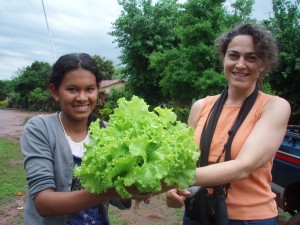Conserving Nature, Empowering Women in Paraguay
 OLYMPUS DIGITAL CAMERA |
| Paraguayan farmer (left) proudly presents her produce with Carla Sbert, Nature Canada manager of conservation programs and legal issues |
Nature Canada is very proud to have successfully completed our latest project in Paraguay, where we helped nearly 500 women farmers in four rural communities to increase their food security, improve their health and strengthen their awareness of their own democratic rights.
We worked in conjunction with our BirdLife International partner, Guyra Paraguay, the Gatineau-based Place aux agricultrices : nurricieres du monde (who invited Nature Canada into the project as a “sponsor” due to our international experience), and the Paraguay social development organization Fortaleser.
What does this have to do with nature conservation?
Many of the women in this project live in or adjacent to the buffer zone of the San Rafael Reserve and the San Rafael Important Bird Area (IBA), a place that contains one of the last large remnants of the endangered Atlantic Forest in Paraguay. Guyra Paraguay has been working for more than a decade here to strengthen its relationships with the San Rafael communities and build support for biodiversity protection – namely promote sustainable agriculture and prevent deforestation and monocultures.
Integrating conservation work with development projects like these is based on the belief that for conservation efforts to be effective, they must deliver benefits to local people. As a partner within the BirdLife International network, Nature Canada has been working with partners in the Americas since 1999 on projects that balance conservation objectives and local needs—social and economic.
This project, by improving the lives of the people in these communities, is also helping to secure a future for the region’s wildlife, including twenty-five species of bird that are at risk globally, like Endangered Black-fronted Piping-guan, Vulnerable Helmeted Woodpecker, and Near-Threatened Solitary Tinamou.
Today, 478 women farmers are practicing organic agriculture. Their organic vegetable gardens are providing fresh produce for their families and for sale. On average, the women increased their consumption of vegetables from three or four products to more than 12. The majority of beneficiaries have seen their income increased by more than 50%, and many are cooperating to market their produce. Awareness of gender equality and the rights of women improved, with some women actively demanding their rights be respected and denouncing acts of domestic violence. By the end of the project, women farmers had formed 10 committees that obtained municipal recognition. Some have started to engage with municipal organizations to further their goals.
The project was supported by the Canadian International Development Agency (CIDA).
